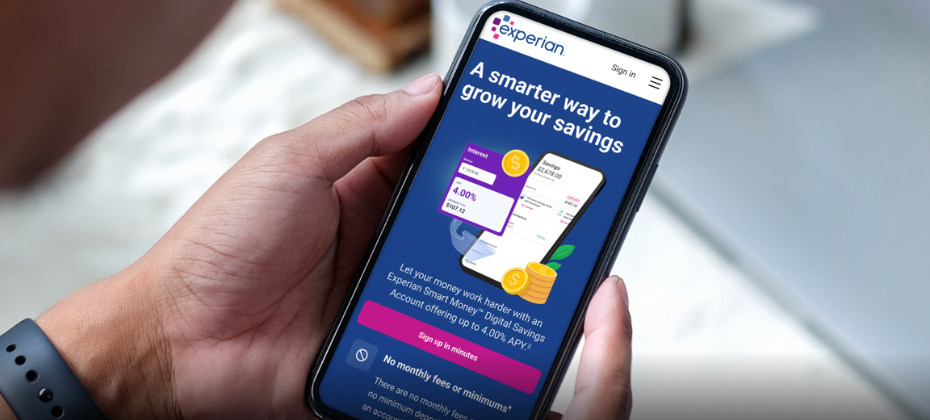
Experian’s groundbreaking agentic AI-powered tool, Experian Assistant, has earned the prestigious 2025 FinTech Breakthrough Award for Analytics Innovation. This recognition comes on the heels of the product solution winning the BIG Innovation Award. These awards underscore Experian’s commitment to pushing the boundaries of innovation by helping our customers achieve success.
24/7 Data Expert
Integrated with the Experian Ascend Platform™, Experian Assistant functions as a 24/7 data expert, enabling financial institutions to optimize their credit and fraud models with ease. Using natural language processing (NLP), the virtual assistant guides users providing insights, recommendations and coding assistance.
The impact is transformative: Experian Assistant cuts model-development timelines from months to just days—and even hours in some cases. By helping users analyze credit and fraud data, adjust model attributes and streamline workflows, it empowers organizations to innovate faster and make data-driven decisions with confidence.
Powered by agentic AI technology, Experian Assistant reimagines how data scientists and analysts approach their work. It accelerates insights, fosters collaboration and empowers businesses to deliver exceptional customer experiences while reducing the time and resources needed to bring new initiatives to market.
Driving Results
While tailored for financial services, Experian Assistant’s capabilities extend across industries. Customers can leverage it for data exploration, model deployment, performance monitoring and faster time-to-market for new offerings. With Experian Assistant, users gain a powerful edge in scoring more consumers, optimizing processes and enhancing overall customer satisfaction.
Commitment to Customers
Experian received this prestigious award that recognizes those “who are dedicated to reshaping the FinTech industry through innovative technologies.” This accolade continues to build Experian Assistant’s position as a game-changing solution for Experian’s customers in financial services and beyond.
Related Posts

For decades, Experian has invested in building one of the most trusted, differentiated data foundations in the world. Experian’s data helps businesses responsibly engage with consumers, manage risk, and grow with confidence. For consumers, these insights drive improved access to affordable credit solutions in some of the most significant moments of their lives. Our focus on building a durable data foundation and persistent identity signals puts Experian in a unique position, especially as technology continues to evolve, and AI reshapes how decisions are made. Incomplete or inconsistent data can lead to bad models and negative outcomes for both businesses and consumers. And, as data and identity signals continue to change, persistence becomes increasingly valuable. Businesses need confidence that the people they’re interacting with are real, reachable, and consistent over time. That’s why we’re excited to announce Experian’s acquisition of AtData – a leading data and intelligence company backed by the world’s most comprehensive email insights technology. AtData’s coverage of real-time email insights, including over 10 billion email addresses worldwide and 98% of active emails in North America, is trusted by thousands of businesses including many of America’s most notable brands and Fortune 500 companies. Our acquisition of AtData builds on our leading, durable identity infrastructure. By adding the most comprehensive email intelligence technology to Experian’s existing identity, data, analytics, and decisioning capabilities, we’re enabling our clients to make faster, more confident, signal-driven decisions. Smarter, more efficient marketing Email remains one of the most direct and effective channels for driving consumer response — and the intelligence behind it is what separates high-performing programs from inefficient ones. Real-time behavioral signals, including engagement, activity frequency, and responsiveness, tell businesses not just whether an address is deliverable, but whether a person is actively reachable and likely to act. Layering these signals across Experian's existing consumer intelligence enables smarter audience prioritization, reduced waste, and better results across the customer journey. Connecting identity across channels and touchpoints The email address has become the center point of modern, digital identity — an anchor linking the signals a person leaves across the digital and physical world, including postal addresses, phone numbers, devices, and more. Adding email-based identity linkages to Experian's robust identity infrastructure gives businesses a more complete, accurate, and durable view of who a person actually is, across channels in an increasingly fragmented identity ecosystem. Stronger fraud prevention and risk management Email behavior is a critical element in helping businesses detect and prevent fraud. Knowing whether an email is newly created, exhibiting bot-like patterns, or inconsistent with other points of identity associated with a person helps businesses identify synthetic identities and separate trusted from higher-risk activity — earlier in the process. These signals sharpen the decisioning capabilities businesses need to act with speed and confidence. Why this matters now AI is raising the bar for speed, personalization, and precision. But AI is only as effective as the data behind it. In this next phase, trusted, differentiated data is what creates real advantage. AtData strengthens our ability to help our clients navigate what comes next — with confidence and at scale. To learn more about AtData, please visit https://atdata.com/.
Published: Feb 23, 2026 by Molly Poppie

We believe financial decisions should feel empowering, not overwhelming. Choosing how to protect your family, planning your next move, building your future, these are personal milestones. Yet too often, the tools meant to help consumers navigate them create friction instead of clarity. We are changing that. Our Consumer-First AI strategy starts with a simple belief: technology should make life easier for people. We’re building AI-powered experiences that meet consumers where they are, cut through complexity, and provide guidance that feels intuitive, supportive, and genuinely helpful. Reimagining Insurance Shopping Through Conversation One example is the launch of our Experian Insurance Marketplace, a leading platform to find and compare auto insurance rates[i], within ChatGPT. Shopping for insurance has long been a frustrating process. Consumers jump from site to site, repeatedly entering information and trying to decode policy differences, often still unsure if they found the right coverage at the right price. Now the experience can begin with a simple question inside ChatGPT. Consumers now can start their journey with Experian and compare estimated rates from more than 35 leading insurance carriers in our network, receive clear coverage explanations, ask follow-up questions in real time, and seamlessly transition into the Experian experience to explore personalized savings and switch carriers. What once took hours across multiple websites can now begin in one guided interaction. Powered by Experian’s Innovation Engine This experience is powered by Experian’s Insurance Marketplace platform and built on years of data expertise, advanced analytics, and strong carrier relationships. It reflects our ability to combine trusted data with emerging AI to create entirely new consumer experiences. For example, consumers can start with a ZIP code to explore price comparisons and, if they choose transition securely to Experian’s website for a personalized quote. This is Consumer-First AI in action. It is not technology for its own sake, but innovation designed to make life easier, build confidence, and give people greater control over their financial journey. Just the Beginning Experian has long helped people build credit, protect their identity, and improve their financial health. Bringing other capabilities, we offer like insurance into conversational AI is a natural extension of that mission. Insurance is only the start in seeing Experian via other platforms. As AI becomes a bigger part of our financial lives, we will continue expanding solutions both within our ecosystem and in other properties like ChatGPT that simplify complex moments and deliver smarter, more personalized guidance wherever consumers are or prefer to engage. Because at Experian, we are committed to being your BFF, your Big Financial Friend, showing up with trusted guidance, practical tools, and support exactly when it matters most. To explore the Experian Insurance Marketplace within ChatGPT or learn more, visit www.experian.com/insurance Insurance products are offered through Gabi Personal Insurance Agency, Inc., d/b/a Experian Insurance Services, a licensed insurance agency. Availability and savings vary by state. Savings are not guaranteed. For license information, visit https://www.experian.com/help/insurance-licenses-disclosure/ [i] Results will vary and some may not see savings.
Published: Feb 19, 2026 by Dacy Yee

We’re starting the year strong by reaffirming our promise to empower consumers on their financial journeys. At Experian, everything we do is driven by our mission to bring Financial Power to All™—helping people not only understand where they stand but confidently move forward. That’s why I’m pleased to introduce the new high-yield Experian Smart Money™ Digital Savings Account[1], designed to make saving effortless, accessible, and more meaningful than ever before. This new offering is more than just a savings account—it represents an important evolution in how Experian supports financial progress. For years, we’ve helped tens of millions of consumers monitor their credit, improve their credit scores, and protect their identities. Now, by adding a high-yield digital savings account to our existing suite of financial health tools, we’re able to anchor that progress to something tangible: real balances and real momentum. With the ability to save built directly into the Experian ecosystem, members can track their savings growth alongside credit improvements, creating a clearer picture of their overall financial health. Positive financial behaviors—like paying down debt, making on-time payments, or improving utilization—can now be experienced in parallel with cash accumulation and stronger financial resilience, all in one trusted place. The Experian Smart Money™ Digital Savings Account offers up to 4.00% variable Annual Percentage Yield[2] (APY), which is nearly 10 times the national average savings rate[3], with no minimum balance or direct deposit requirement. It’s seamlessly integrated into the Experian membership experience, making it easier for consumers to take action the moment insight appears. This launch builds on the success of our Experian Smart Money™ Digital Checking Account & Debit Card introduced in 2023 and reflects our continued commitment to creating products that meet consumers wherever they are on their financial journey. We believe saving is a foundational financial behavior—and one that plays a powerful, often underappreciated role in credit outcomes. Strong credit health isn’t just about borrowing; it’s closely tied to liquidity, cash flow stability, and financial resilience. Having accessible savings can help consumers stay current on bills during income disruptions, build buffers that reduce reliance on higher-cost credit, and create flexibility that can support long-term credit improvement. In this way, a high-yield digital savings account becomes more than a place to store money—it becomes a practical tool for building healthier financial habits. Whether it’s emergency savings, goal-based saving, or smoothing cash flow, an Experian Smart Money Digital Savings Account enables consumers to turn good intentions into consistent action. This launch also reflects our broader evolution beyond a traditional credit bureau. Today, Experian membership provides access to credit monitoring and improvement tools, identity protection, a credit card marketplace, auto insurance comparison shopping, and personalized guidance through our AI-powered virtual assistant, EVA. Adding a high-yield digital savings account allows us to take the next step with our members—bridging the gap between insight and action. Instead of stopping at “here’s where you stand,” Experian can now help consumers actively build positive financial momentum. We’re extending our role as consumers’ BFF—Big Financial Friend—by making it easier to save, plan, and grow within the same ecosystem they already trust. By innovating and delivering products that truly make a difference in people’s everyday financial lives, we’re continuing to advance our mission and help consumers turn knowledge into progress. Learn more at experian.com/smartmoney. [1] The Experian Smart Money™ Debit Card is issued by Community Federal Savings Bank (CFSB), pursuant to a license from Mastercard International. Banking services provided by CFSB, Member FDIC. Experian is a Program Manager, not a bank. See Experian.com/legal. [2] The Annual Percentage Yield (APY) is 2.00%, 3.00% or 4.00% as of today’s date based on the Experian membership status. The APY may change at any time before or after your account is opened. Changes to the Experian membership can impact the APY, interest rate, and features. The interest rate and APY may be lower during membership trial periods. No minimum deposit to open account. Balance must be at least $0.01 to earn APY. Learn more. [3] As of Dec. 15, 2025, the national average rate for savings accounts was 0.39%, according to the FDIC.
Published: Feb 09, 2026 by Sean Healey